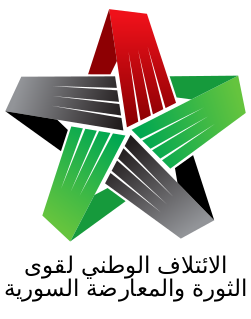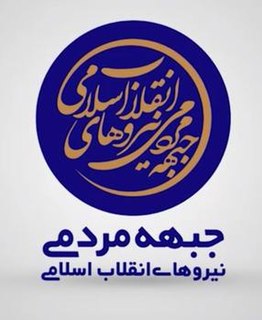See also
| This article includes a list of related items that share the same name (or similar names). If an internal link incorrectly led you here, you may wish to change the link to point directly to the intended article. |
Coordination Council may refer to:
| This article includes a list of related items that share the same name (or similar names). If an internal link incorrectly led you here, you may wish to change the link to point directly to the intended article. |

The People's Mujahedin Organization of Iran, or the Mujahedin-e-Khalq, is an Iranian political-militant organization. It advocates overthrowing the Islamic Republic of Iran leadership and installing its own government. Its revolutionary interpretation of Islam contrasts with the conservative Islam of the traditional clergy as well as the populist Islamism developed by Ayatollah Khomeini in the 1970s. It is also considered the Islamic Republic of Iran's biggest and most active political opposition group.

The Iranian Revolution was a series of events that culminated in the overthrow of the Pahlavi dynasty under Shah Mohammad Reza Pahlavi, and the replacement of his government with an Islamic republic under the Grand Ayatollah Ruhollah Khomeini, a leader of one of the factions in the revolt. The revolution was supported by various Islamist and leftist organizations and student movements.

Iran's ninth presidential election took place in two rounds, the first on 17 June 2005, the run-off on 24 June. Mohammad Khatami, the previous President of Iran, stepped down on 2 August 2005, after serving his maximum two consecutive four-year terms according to the Islamic Republic's constitution. The election led to the victory of Mahmoud Ahmadinejad, the hardline mayor of Tehran, with 19.48% of the votes in the first round and 61.69% in the second. Factors thought to have contributed to Ahmadinejad's victory include mobilization of mosque networks and conservative/hardline voters, and a protest vote against corrupt elite insiders and for "new political blood". A loyal supporter of conservative Supreme Leader Khamenei, Ahmadinejad kissed the leader's hand during his authorization ceremony. Officials reported a turnout of about 59% of Iran's 47 million eligible voters, a decline from the 63% turnout reported in the first round of balloting a week before.

Liberalism in Iran or Iranian liberalism is a political ideology that traces its beginnings to the 20th century.

The National Council of Resistance of Iran is an Iranian political organization based in France and Albania. The organization is a political coalition calling to replace the Iranian regime. The coalition is made up of different Iranian dissident groups, with its main member being the People's Mujahedin of Iran (MEK). Both organizations are considered to be led by Massoud Rajavi and his wife Maryam Rajavi.

The Badr Organization, previously known as the Badr Brigades or Badr Corps, is an Iraqi Shia Islamist political party and military organization headed by Hadi Al-Amiri. The Badr Brigade was the Iran-officered military wing of the Iran-based Shia Islamic party, Supreme Council for Islamic Revolution in Iraq (SCIRI), formed in 1982. Since the 2003 invasion of Iraq most of Badr's fighters have entered the new Iraqi army and police force. Politically, Badr Brigade and SCIRI were considered to be one party since 2003, but have now unofficially separated with the Badr Organization now an official Iraqi political party. Badr Brigade forces, and their Iranian commanders, have come to prominence in 2014 fighting the Islamic State of Iraq and the Levant (ISIL) in Iraq. It is a part of the Popular Mobilization Forces.

The National Front of Iran is an opposition political organization in Iran, founded by Mohammad Mosaddegh in 1949. It is the oldest and arguably the largest pro-democracy group operating inside Iran despite having never been able to recover the prominence it had in the early 1950s.
The Council of the Islamic Revolution was a group formed by Ayatollah Ruhollah Khomeini to manage the Iranian Revolution on 10 January 1979, shortly before he returned to Iran. "Over the next few months there issued from the council hundreds of rulings and laws, dealing with everything from bank nationalization to nurses' salaries." Its existence was kept a secret during the early, less secure time of the revolution, and its members and the exact nature of what the council did remained undisclosed to the public until early 1980. Some of the council's members like Motahhari, Taleqani, Bahonar, Beheshti, Qarani died during Iran–Iraq War or were assassinated by the MKO during the consolidation of the Iranian Revolution. Most of those who remained were put aside by the regime.

The Freedom Movement of Iran (FMI) or Liberation Movement of Iran is an Iranian pro-democracy political organization founded in 1961, by members describing themselves as "Muslims, Iranians, Constitutionalists and Mossadeghists". It is the oldest party still active in Iran and has been described as a "semi-opposition" or "loyal opposition" party. It has also been described as a "religious nationalist party".

The parliamentary election for the 9th Islamic Consultative Assembly, or Majlis, were held in Iran on Friday, 2 March 2012 with a second round on 4 May 2012 in those 65 districts where no candidate received 25% or more of the votes cast. More than 5,000 candidates registered but more than a third were disqualified by the Guardian Council leaving about 3,400 candidates to run for the 290 seat representing the 31 provinces.

The Syrian opposition is the political structure represented by the Syrian National Coalition and associated Syrian anti-government groups with certain territorial control as an alternative Syrian government.

The National Coalition for Syrian Revolution and Opposition Forces, commonly named the Syrian National Coalition (SNC), is a coalition of opposition groups in the Syrian Civil War that was founded in Doha, Qatar, in November 2012. Former imam of the Umayyad Mosque in Damascus, Moaz al-Khatib, considered a moderate, was elected the president of the coalition, and resigned on 21 April 2013. Riad Seif and Suheir Atassi, both prominent democracy activists and the latter a secular human rights advocate, were elected vice presidents. The post of a third vice president will remain vacant for a Kurdish figure to be elected. Mustafa Sabbagh was elected as the coalition's secretary-general. The coalition has a council of 114 seats, though not all of them are filled.
The 2012–2014 Quneitra Governorate clashes began in early November 2012, when the Syrian Army began engaging with rebels in several towns and villages of the Quneitra Governorate. The clashes quickly intensified and spilled into the UN-supervised neutral demilitarized zone between Syrian controlled territory and the Israeli-occupied Golan Heights.
A number of states and armed groups have involved themselves in the ongoing Syrian Civil War.
The Principlists, also interchangeably known as the Iranian Conservatives and formerly referred to as the Right or Right-wing, are one of two main political camps inside post-revolutionary Iran, the other being Reformists. The term hardliners that some western sources use in the Iranian political context usually refers to the faction, although it also includes more centrist tendencies.
The Council for Coordinating the Reforms Front or the Reformist Front Coordination Council is the umbrella organization, coalition and council of main political groups within the Iranian reform movement. Since 2015, it is overseen by the Reformists' Supreme Council for Policy-making.

The Popular Front of Islamic Revolution Forces is a political organization in Iran, founded in late 2016 by ten figures from different spectrum of conservative factions.

The High Negotiations Committee (HNC) is an umbrella body which was created to represent the Syrian opposition in the planned Geneva peace talks in 2016. It is led by Riyad Farid Hijab, who was Prime Minister of Syria from June to August 2012. It is considered to be Syria's main or broadest opposition bloc.
The Coordination Council of Islamic Revolution Forces is an umbrella organization of conservative political organizations and figures in Iran, known for its activity during the 2000s, when it was considered "Iran's main conservative alliance".
The following is a timeline of the Syrian Civil War from January to April 2019. Information about aggregated casualty counts is found at Casualties of the Syrian Civil War.